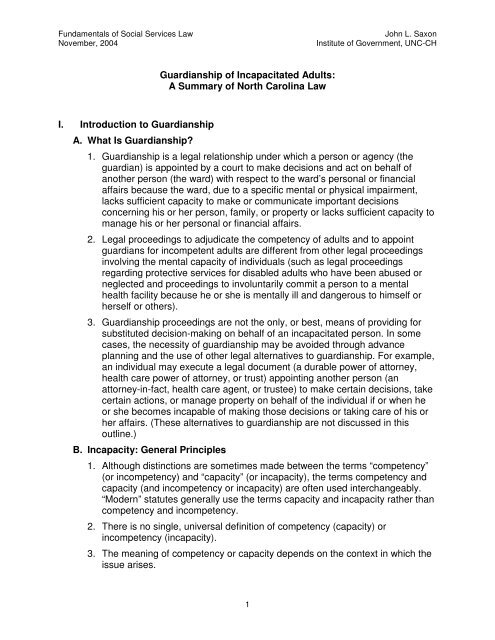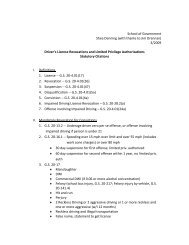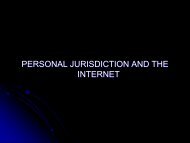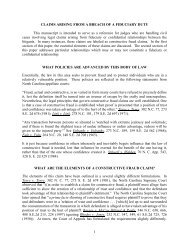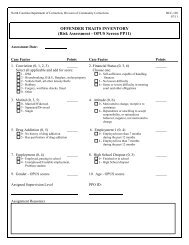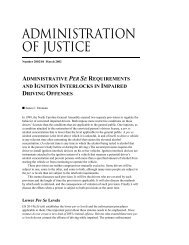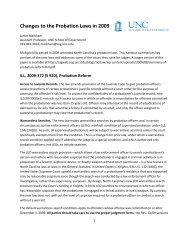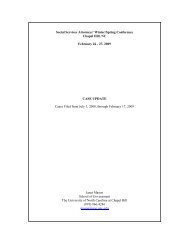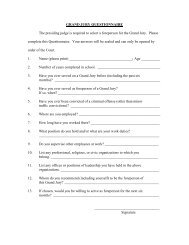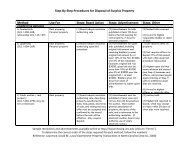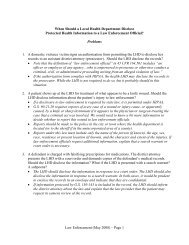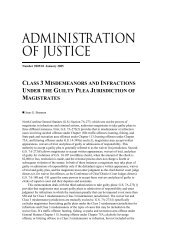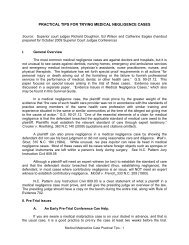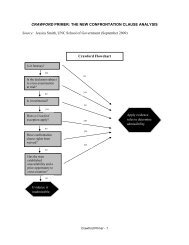Guardianship of Incapacitated Adults: A Summary of North Carolina ...
Guardianship of Incapacitated Adults: A Summary of North Carolina ...
Guardianship of Incapacitated Adults: A Summary of North Carolina ...
Create successful ePaper yourself
Turn your PDF publications into a flip-book with our unique Google optimized e-Paper software.
Fundamentals <strong>of</strong> Social Services Law<br />
November, 2004<br />
John L. Saxon<br />
Institute <strong>of</strong> Government, UNC-CH<br />
<strong>Guardianship</strong> <strong>of</strong> <strong>Incapacitated</strong> <strong>Adults</strong>:<br />
A <strong>Summary</strong> <strong>of</strong> <strong>North</strong> <strong>Carolina</strong> Law<br />
I. Introduction to <strong>Guardianship</strong><br />
A. What Is <strong>Guardianship</strong>?<br />
1. <strong>Guardianship</strong> is a legal relationship under which a person or agency (the<br />
guardian) is appointed by a court to make decisions and act on behalf <strong>of</strong><br />
another person (the ward) with respect to the ward’s personal or financial<br />
affairs because the ward, due to a specific mental or physical impairment,<br />
lacks sufficient capacity to make or communicate important decisions<br />
concerning his or her person, family, or property or lacks sufficient capacity to<br />
manage his or her personal or financial affairs.<br />
2. Legal proceedings to adjudicate the competency <strong>of</strong> adults and to appoint<br />
guardians for incompetent adults are different from other legal proceedings<br />
involving the mental capacity <strong>of</strong> individuals (such as legal proceedings<br />
regarding protective services for disabled adults who have been abused or<br />
neglected and proceedings to involuntarily commit a person to a mental<br />
health facility because he or she is mentally ill and dangerous to himself or<br />
herself or others).<br />
3. <strong>Guardianship</strong> proceedings are not the only, or best, means <strong>of</strong> providing for<br />
substituted decision-making on behalf <strong>of</strong> an incapacitated person. In some<br />
cases, the necessity <strong>of</strong> guardianship may be avoided through advance<br />
planning and the use <strong>of</strong> other legal alternatives to guardianship. For example,<br />
an individual may execute a legal document (a durable power <strong>of</strong> attorney,<br />
health care power <strong>of</strong> attorney, or trust) appointing another person (an<br />
attorney-in-fact, health care agent, or trustee) to make certain decisions, take<br />
certain actions, or manage property on behalf <strong>of</strong> the individual if or when he<br />
or she becomes incapable <strong>of</strong> making those decisions or taking care <strong>of</strong> his or<br />
her affairs. (These alternatives to guardianship are not discussed in this<br />
outline.)<br />
B. Incapacity: General Principles<br />
1. Although distinctions are sometimes made between the terms “competency”<br />
(or incompetency) and “capacity” (or incapacity), the terms competency and<br />
capacity (and incompetency or incapacity) are <strong>of</strong>ten used interchangeably.<br />
“Modern” statutes generally use the terms capacity and incapacity rather than<br />
competency and incompetency.<br />
2. There is no single, universal definition <strong>of</strong> competency (capacity) or<br />
incompetency (incapacity).<br />
3. The meaning <strong>of</strong> competency or capacity depends on the context in which the<br />
issue arises.<br />
1
Fundamentals <strong>of</strong> Social Services Law<br />
November, 2004<br />
John L. Saxon<br />
Institute <strong>of</strong> Government, UNC-CH<br />
a) Issues regarding the competency or capacity <strong>of</strong> an individual to manage<br />
his or her own affairs or make decisions regarding himself or herself, his<br />
or her family, or his or her property arise in a number <strong>of</strong> different legal,<br />
medical, and social contexts other than guardianship (for example:<br />
competency to stand trial on criminal charges; insanity defense in criminal<br />
proceedings; involuntary commitment proceedings; capacity to marry,<br />
make a will, or enter into a binding contract; etc.).<br />
b) The definition <strong>of</strong> competency or capacity in one legal, medical, or social<br />
context is not necessarily the same as the definition <strong>of</strong> competency or<br />
capacity in a different legal, medical, or social context.<br />
4. It is difficult, if not impossible, to define or determine competency or<br />
incompetency in the abstract. An individual’s capacity or incapacity generally<br />
must be determined in relation to his or her ability or inability to do a specific<br />
act or perform a specific function. A person may have the capacity to do X but<br />
lack the capacity to do Y.<br />
C. The Legal Relationship Between Incompetency and <strong>Guardianship</strong><br />
1. The law presumes that all adults are legally competent and have the ability<br />
and right to manage their own affairs and make decisions affecting<br />
themselves, their families, and their property.<br />
2. A guardian may not be appointed to manage the affairs <strong>of</strong> an adult or make<br />
decisions on behalf <strong>of</strong> an adult unless a court has determined that the adult is<br />
incompetent.<br />
3. The legal definition <strong>of</strong> incompetency determines when the State’s authority,<br />
based on its parens patriae responsibility to protect incapacitated adults who<br />
cannot care for themselves, may be “triggered” to limit the individual rights<br />
and autonomy <strong>of</strong> an adult through the appointment <strong>of</strong> a guardian to manage<br />
his or her affairs or make decisions.<br />
4. A legal definition <strong>of</strong> incompetency in guardianship proceedings should<br />
recognize, respect, and balance both the State’s responsibility with respect to<br />
incapacitated adults who cannot care for themselves and the right <strong>of</strong><br />
individuals to make decisions for themselves as long as they do not lack the<br />
capacity to do so.<br />
5. The “trigger” or “threshold” for incompetency in guardianship proceedings<br />
should not be set too low (allowing the appointment <strong>of</strong> guardians to make<br />
decisions for persons who do not lack the capacity to make their own<br />
decisions) or too high (preventing the appointment <strong>of</strong> guardians to make<br />
decisions for and protect the safety, welfare, and rights <strong>of</strong> persons who lack<br />
the capacity to care for themselves).<br />
6. A legal definition <strong>of</strong> incompetency is insufficient, in and <strong>of</strong> itself, to protect<br />
individual rights and autonomy. Individual rights in guardianship proceedings<br />
must be protected through procedural, as well as substantive, requirements<br />
(notice, right to counsel, etc.).<br />
2
Fundamentals <strong>of</strong> Social Services Law<br />
November, 2004<br />
John L. Saxon<br />
Institute <strong>of</strong> Government, UNC-CH<br />
II.<br />
7. In guardianship proceedings, incompetency is a legal, not medical,<br />
determination.<br />
<strong>North</strong> <strong>Carolina</strong>’s Definition <strong>of</strong> Incompetency<br />
A. G.S. 35A-1101(7) (1987)<br />
1. Statutory definition <strong>of</strong> incompetency:<br />
a) Lacks sufficient capacity<br />
b) Due to mental illness, mental retardation, epilepsy, cerebral palsy, autism,<br />
inebriety, senility, disease, injury, or similar cause or condition<br />
c) To manage his or her own affairs or<br />
d) To make or communicate important decisions concerning his or her<br />
person, family, or property.<br />
B. Legal Analysis <strong>of</strong> <strong>North</strong> <strong>Carolina</strong>’s Definition <strong>of</strong> Incompetency<br />
1. Three “components” <strong>of</strong> incompetency<br />
a) Medical condition (specified mental or physical condition or disability)<br />
b) Cognitive or communicative impairment (inability to make or communicate<br />
decisions)<br />
c) Functional or behavioral impairment (inability to manage affairs)<br />
2. In a sense, the cognitive impairment and functional impairment components<br />
<strong>of</strong> incompetency are simply different sides <strong>of</strong> the same coin. Both relate to the<br />
respondent’s mental capacity. The cognitive impairment component<br />
addresses the respondent’s mental capacity directly and assumes that a<br />
respondent who is cognitively impaired will also lack sufficient capacity to<br />
manage his or her own affairs or care for himself or herself. The functional<br />
impairment component addresses mental capacity indirectly. It assumes that<br />
a person who lacks sufficient capacity to manage his or her own affairs or<br />
care to himself or herself is cognitively impaired (if he or she also has been<br />
diagnosed as suffering from a mental impairment).<br />
3. Incompetency must be based on at least two <strong>of</strong> these three components.<br />
a) Incompetency = (1) mental or physical condition (mental illness, etc.) +<br />
functional impairment (incapacity to manage affairs) resulting from mental<br />
or physical condition or (2) mental or physical condition (mental illness,<br />
etc.) + cognitive or communicative impairment (inability to make or<br />
communicate decisions) resulting from mental or physical condition.<br />
b) Note: There must be a causal link between the respondent’s incapacity<br />
(functional, behavioral, cognitive, or communicative impairment) and the<br />
respondent’s status (mental illness, etc.).<br />
4. Mental or physical condition<br />
a) An individual may not be adjudicated incompetent without pro<strong>of</strong> that he or<br />
she is mentally ill, mentally retarded, or senile, suffers from cerebral palsy,<br />
3
Fundamentals <strong>of</strong> Social Services Law<br />
November, 2004<br />
John L. Saxon<br />
Institute <strong>of</strong> Government, UNC-CH<br />
III.<br />
autism, or inebriety, or suffers from some other disease, injury, or<br />
condition that impairs his or her capacity to manage his or her affairs or to<br />
make or communicate important decisions regarding himself or herself, his<br />
or her family, or his or her property.<br />
b) Physical conditions that result in functional or behavioral impairments<br />
generally are insufficient to establish incompetency unless they also result<br />
in cognitive or communicative incapacity. See Goodson v. Lehmon, 224<br />
N.C. 616, 31 S.E.2d 756 (1944). [Steven Hawking (a British astrophysicist<br />
who suffers from amyotrophic lateral sclerosis (Lou Gehrig’s disease)) is<br />
severely physically disabled and dependent on others for his physical<br />
needs but is not mentally incompetent.]<br />
c) Pro<strong>of</strong> that an individual is mentally ill, mentally retarded, or senile, suffers<br />
from cerebral palsy, autism, or inebriety, or suffers from some other<br />
disease, injury, or condition is not legally sufficient, in and <strong>of</strong> itself, to<br />
establish incompetency. The respondent’s mental or physical condition<br />
must result in cognitive, communicative, functional, or behavioral<br />
incapacity.<br />
5. Incapacity<br />
a) A person is incompetent to manage his or her affairs if his or her mental<br />
condition is such that “he [or she] is incapable <strong>of</strong> transacting the ordinary<br />
business involved in taking care <strong>of</strong> his [or her] property [or] is incapable <strong>of</strong><br />
exercising rational judgment and weighing the consequences <strong>of</strong> his [or<br />
her] acts upon himself [or herself], his [or her] family, or his [or her]<br />
property and estate.” Hagins v. Redevelopment Comm’n <strong>of</strong> Greensboro,<br />
275 N.C. 90, 165 S.E.2d 490 (1969).<br />
b) A person is not incompetent to manage his or her affairs if “he [or she]<br />
understands what is necessarily required for the management <strong>of</strong> his [or<br />
her] ordinary business affairs and is able to perform those acts with<br />
reasonable continuity, if he [or she] comprehends the effect <strong>of</strong> what he [or<br />
she] does, and can exercise his [or her] own will.” Hagins v.<br />
Redevelopment Comm’n <strong>of</strong> Greensboro, 275 N.C. 90, 165 S.E.2d 490<br />
(1969).<br />
<strong>Guardianship</strong> Proceedings (Part I): Determining Legal Incapacity<br />
A. Initiating a <strong>Guardianship</strong> Proceeding<br />
1. Incompetency and guardianship proceedings as “special proceedings” in<br />
superior court, not civil actions. The parties to a special proceeding involving<br />
incompetency and guardianship are the petitioner and the respondent (the<br />
allegedly incapacitated adult or ward).<br />
2. The Clerk <strong>of</strong> Superior Court (CSC) (or an Assistant CSC designated by the<br />
CSC) is the judge in special proceedings involving incompetency and<br />
guardianship and has exclusive, original jurisdiction over all proceedings<br />
seeking the appointment <strong>of</strong> a guardian for an allegedly incapacitated adult.<br />
4
Fundamentals <strong>of</strong> Social Services Law<br />
November, 2004<br />
John L. Saxon<br />
Institute <strong>of</strong> Government, UNC-CH<br />
3. A proceeding seeking the appointment <strong>of</strong> a guardian for an allegedly<br />
incapacitated adult may be instituted by any person, including the spouse, a<br />
child, or relative <strong>of</strong> the allegedly incapacitated person, a friend or neighbor, a<br />
creditor, a stranger, a person who is not a resident <strong>of</strong> <strong>North</strong> <strong>Carolina</strong>, or a<br />
public <strong>of</strong>ficial or public agency (such as a county social services director or an<br />
area mental health authority).<br />
4. “Fill-in-the-blank” forms for the petition and notice required to institute a<br />
guardianship proceeding are available in the CSC <strong>of</strong>fice.<br />
5. The court fee for filing a guardianship proceeding is $40.00. The CSC,<br />
however, will not require that the filing fee for a guardianship proceeding be<br />
paid in advance when the petition is filed by a county agency.<br />
B. Notice and Hearing<br />
1. After the petition is filed, the CSC issues a notice <strong>of</strong> hearing. A copy <strong>of</strong> the<br />
petition and notice <strong>of</strong> hearing must be personally served on the respondent by<br />
the sheriff. The petitioner (through the sheriff or via certified mail) must also<br />
serve copies <strong>of</strong> the petition and notice on the respondent’s attorney or<br />
attorney/GAL, and mail (first-class) a copy <strong>of</strong> the petition and notice to the<br />
respondent’s next-<strong>of</strong>-kin and to any other person specified by the CSC.<br />
2. The respondent is entitled to be represented by an attorney that he or she<br />
chooses or by an attorney/guardian ad litem (attorney/GAL) appointed by the<br />
court. When a guardianship proceeding is filed, the CSC is required to<br />
appoint an attorney/GAL to represent the respondent. If the respondent<br />
retains his or her own attorney, the CSC may discharge the appointed<br />
attorney/GAL.<br />
a) The attorney/GAL must personally visit the respondent as soon as<br />
possible.<br />
b) The attorney/GAL must make reasonable efforts to determine the<br />
respondent’s wishes regarding the incompetency and guardianship<br />
proceeding and must present the respondent’s express wishes to the CSC<br />
at the hearing. The attorney/GAL may make recommendations to the CSC<br />
regarding the respondent’s best interests if different from the respondent’s<br />
express wishes.<br />
c) In appropriate cases, the attorney/GAL must consider the possibility <strong>of</strong><br />
limited guardianship and make recommendations to the CSC regarding<br />
the rights, powers, and privileges that should be retained by the<br />
respondent.<br />
3. The hearing in a guardianship proceeding must be held before the CSC no<br />
sooner than 10 days and not later than 30 days after the notice <strong>of</strong> hearing and<br />
petition are served on the respondent.<br />
4. Upon motion <strong>of</strong> the petitioner, the CSC may, after providing notice to the<br />
respondent and holding a hearing, appoint an “interim guardian” for the<br />
respondent if the CSC finds from the evidence presented that there is<br />
5
Fundamentals <strong>of</strong> Social Services Law<br />
November, 2004<br />
John L. Saxon<br />
Institute <strong>of</strong> Government, UNC-CH<br />
reasonable cause to believe that the respondent is incapacitated and the<br />
immediate appointment <strong>of</strong> an interim guardian is necessary to protect the<br />
respondent or the respondent’s estate from imminent or foreseeable risk <strong>of</strong><br />
harm.<br />
a) The authority <strong>of</strong> an interim guardian is limited to addressing the conditions<br />
that necessitated the interim guardianship.<br />
b) The interim guardianship terminates 45 days after the order appointing an<br />
interim guardian (or 90 days if the CSC extends the interim guardianship<br />
for good cause shown), when the guardianship proceeding is dismissed,<br />
or when the CSC appoints a permanent guardian for the respondent,<br />
whichever is earlier.<br />
5. The CSC may, on motion <strong>of</strong> a party or sua sponte, order a multi-disciplinary<br />
evaluation (MDE) <strong>of</strong> the respondent to assist in determining the nature and<br />
extent <strong>of</strong> a respondent’s incapacity or to assist in developing an appropriate<br />
guardianship plan.<br />
a) The MDE is an evaluation that contains current (within one year) medical,<br />
psychological, social work, and other pr<strong>of</strong>essional evaluations <strong>of</strong> the<br />
respondent. (Guidelines for conducting MDEs have been issued by the<br />
DHHS Division <strong>of</strong> Social Services.)<br />
b) If the CSC orders an MDE, he or she must designate a state or local<br />
human resources agency (such as a county department <strong>of</strong> social services,<br />
a local public health department, or an area mental health authority) to<br />
prepare the MDE. The designated agency must file the MDE with the CSC<br />
within 30 days after the agency receives the order for the MDE.<br />
c) The MDE is not a public record. Copies <strong>of</strong> the MDE must be provided to<br />
the petitioner and to the respondent’s attorney or attorney/GAL.<br />
6. The respondent (personally or through his or her attorney or attorney/GAL)<br />
has the right to a jury trial on the issue <strong>of</strong> legal incapacity if he or she requests<br />
a jury trial in a timely manner.<br />
a) The petitioner does not have the right to have the issue <strong>of</strong> the<br />
respondent’s capacity decided by a jury. The CSC, however, may order,<br />
sua sponte, that the issue <strong>of</strong> the respondent’s capacity be decided by a<br />
jury even if the respondent has waived his or her right to a jury trial.<br />
b) If the case is heard by a jury, the jury consists <strong>of</strong> twelve persons drawn<br />
from the jury pool. If the case is not heard by a jury, the CSC hears the<br />
case and decides all issues <strong>of</strong> fact and law.<br />
7. Hearings in guardianship proceedings are open to the public unless the<br />
respondent (personally or through his or her attorney or attorney/GAL)<br />
request that the hearing be closed.<br />
8. At the hearing, the petitioner and respondent are entitled to present testimony<br />
and documentary evidence, to subpoena witnesses and documents, and to<br />
6
Fundamentals <strong>of</strong> Social Services Law<br />
November, 2004<br />
John L. Saxon<br />
Institute <strong>of</strong> Government, UNC-CH<br />
examine and cross-examine witnesses. <strong>Guardianship</strong> hearings, however, are<br />
typically short and informal.<br />
9. The first issue that the CSC (or jury) must determine is whether the<br />
respondent is legally incapacitated (incompetent).<br />
a) The petitioner has the burden <strong>of</strong> proving the respondent’s incapacity by<br />
clear, cogent, and convincing evidence (a higher standard <strong>of</strong> pro<strong>of</strong> than<br />
required in most civil cases but less than the standard <strong>of</strong> pro<strong>of</strong> in criminal<br />
cases [beyond a reasonable doubt]).<br />
b) If the CSC (or jury) determines that the respondent is legally incapacitated<br />
(incompetent), the CSC must then determine whether appointment <strong>of</strong> a<br />
guardian is necessary, who should be appointed guardian, what powers<br />
and duties should be given to the guardian, and what rights the<br />
respondent should retain.<br />
c) If the CSC (or jury) finds that the respondent is not incapacitated, the CSC<br />
must enter an order dismissing the proceeding.<br />
IV. Evaluating, Proving, and Determining Incapacity<br />
A. Mental or Physical Condition<br />
1. Diagnosis by health care pr<strong>of</strong>essional. Factors to consider: qualifications <strong>of</strong><br />
pr<strong>of</strong>essional; basis for diagnosis (length <strong>of</strong> examination, tests, frequency <strong>of</strong><br />
contact, etc.); whether diagnosis is recent; etiology <strong>of</strong> condition; possible<br />
alternative causes <strong>of</strong> conditions; duration <strong>of</strong> condition; prognosis and<br />
treatment; effect <strong>of</strong> condition on cognitive, communicative, and functional<br />
ability; extent <strong>of</strong> incapacity; second opinion; hearsay.<br />
2. The CSC may order, but is not required to order, a multidisciplinary evaluation<br />
(containing recent medical, psychological, and social work evaluations <strong>of</strong><br />
respondent) to assist the CSC in determining the nature and extent <strong>of</strong> a<br />
respondent’s incapacity. See GS 35A-1111. Consider order for<br />
multidisciplinary exam in contested cases, when medical evidence regarding<br />
respondent’s mental or physical condition is lacking, or when limited<br />
guardianship may be appropriate.<br />
3. Testimony by lay witnesses. Unclear whether, in a contested case, lay<br />
witness may testify or <strong>of</strong>fer opinion regarding underlying basis (mental or<br />
physical illness, injury, disease, etc.) <strong>of</strong> respondent’s mental or physical<br />
condition as opposed to observable effects there<strong>of</strong>.<br />
B. Cognitive or Communicative Impairment<br />
1. Assessment <strong>of</strong> the respondent’s cognitive capacity should focus on the<br />
respondent’s decision-making process more than the decisional output <strong>of</strong> the<br />
respondent’s reasoning. The issue is whether the respondent’s reasoning<br />
process is significantly impaired, not whether the respondent’s decisions are,<br />
in an objective sense, reasonable.<br />
7
Fundamentals <strong>of</strong> Social Services Law<br />
November, 2004<br />
John L. Saxon<br />
Institute <strong>of</strong> Government, UNC-CH<br />
2. In assessing the respondent’s cognitive capacity, the issue is not whether the<br />
respondent’s cognitive abilities are impaired, subaverage, or suboptimal, but<br />
rather whether the respondent’s cognitive abilities are at least minimally<br />
sufficient to make important decisions regarding his or her person, family, or<br />
property.<br />
3. Elements to consider in assessing cognitive capacity: awareness (extent <strong>of</strong><br />
respondent’s capacity to perceive, concentrate, remember information);<br />
comprehension (ability to understand and assimilate information); reasoning<br />
(ability to integrate and rationally evaluate information); deliberation (ability to<br />
weigh facts and alternatives in light <strong>of</strong> personal values and potential<br />
consequences); choice (ability to express in a sufficiently stable and<br />
consistent manner one’s preference or decision).<br />
4. Questions that might be asked in determining cognitive capacity: Can the<br />
individual communicate a definite decision or choice that is stable enough to<br />
be implemented? Can the person understand the facts that are relevant to the<br />
decision at hand? Can the person weigh relevant information based on his or<br />
her own values? Does the person appreciate the nature <strong>of</strong> the situation and<br />
the possible consequences <strong>of</strong> his or her decision?<br />
5. Cognitive capacity is rarely an all or nothing matter. It therefore should be<br />
assessed on a “sliding scale” (see attachment). Less capacity is required with<br />
respect to simple decisions and in situations involving low risk and high<br />
benefit or minimal adverse consequences to the individual. More capacity is<br />
required with respect to complex decisions and in situations involving high<br />
risk and low benefit or significant adverse consequences to the individual.<br />
6. A qualified pr<strong>of</strong>essional may express his or her opinion with respect to the<br />
extent <strong>of</strong> the respondent’s cognitive (and communicative) capacity. Lay<br />
witnesses and the guardian ad litem may testify or present evidence that<br />
relates to the respondent’s cognitive and communicative capacity.<br />
7. MDE should address respondent’s capacity to make and communicate<br />
important decisions regarding his or her person, family, and property.<br />
Screening tests (such as the Folstein MMSE) may be helpful but are not<br />
determinative, although a score <strong>of</strong> 18 or less strongly suggests diminished<br />
cognitive capacity.<br />
C. Functional Impairment<br />
1. Functional and behavioral domains that should be considered: ability to<br />
manage property (investment, spending, disposition, etc.); ability to transact<br />
ordinary business; ability to make appropriate decisions with respect to<br />
shelter, nutrition, health care, personal hygiene, safety, etc.<br />
2. Pr<strong>of</strong>essional assessments that address the respondent’s capacity with<br />
respect to activities <strong>of</strong> daily living (ADLs include activities such as bathing,<br />
feeding, toileting, mobility, etc.) or instrumental activities <strong>of</strong> daily living (IADLs<br />
including activities such as managing medications, managing finances, meal<br />
8
Fundamentals <strong>of</strong> Social Services Law<br />
November, 2004<br />
John L. Saxon<br />
Institute <strong>of</strong> Government, UNC-CH<br />
preparation, use <strong>of</strong> telephone, etc.) may be useful in determining whether or<br />
to what extent the respondent is unable to manage his or her affairs.<br />
3. The fact that a person is unable to care for himself or herself without the<br />
assistance <strong>of</strong> others due to a physically disability or impairment is not<br />
sufficient to support a finding <strong>of</strong> incapacity unless he or she also lacks the<br />
mental capacity to make appropriate decisions that would enable him or her<br />
to obtain necessary care or assistance from others.<br />
4. As in the case <strong>of</strong> cognitive capacity, the issue in assessing the respondent’s<br />
functional capacity is not whether the respondent’s functional abilities are<br />
impaired, subaverage, or suboptimal, but rather whether the respondent’s<br />
functional abilities are at least minimally sufficient to ensure his or her own<br />
well-being.<br />
V. <strong>Guardianship</strong> Proceedings (Part II): Appointing a Guardian<br />
A. Application and Hearing<br />
1. An application for appointment <strong>of</strong> a guardian for an incapacitated adult must<br />
be filed with the CSC.<br />
2. Any person may file an application seeking the appointment <strong>of</strong> a guardian for<br />
an incapacitated adult.<br />
3. In most cases, the application for appointment <strong>of</strong> a guardian is filed by the<br />
person or agency who files the petition seeking a determination that the<br />
respondent is legally incompetent and is filed as part <strong>of</strong> the original petition.<br />
An application for appointment <strong>of</strong> a guardian, however, may be filed by a<br />
person who is not the petitioner and may be filed subsequent to the petition or<br />
order adjudicating the respondent’s incapacity.<br />
4. The person filing the application may nominate himself or herself as the<br />
ward’s guardian or recommend other potential guardians to the clerk. The<br />
CSC also may consider the recommendations <strong>of</strong> the ward’s next <strong>of</strong> kin or<br />
other persons with respect to who should be appointed as the ward’s<br />
guardian.<br />
5. The CSC may not appoint a guardian for an adult unless the adult has been<br />
adjudicated legally incapacitated (incompetent). If an adult is adjudicated<br />
legally incapacitated, the CSC must appoint a guardian for the incapacitated<br />
adult.<br />
6. The parent <strong>of</strong> an incapacitated adult may not appoint a person as the adult<br />
child’s guardian following the parent’s death by naming the person as the<br />
child’s guardian in the parent’s will. The “standby guardian” provisions in GS<br />
35A, Art. 21 apply only with respect to guardians for minor children.<br />
7. Before appointing a guardian, the CSC must “make such inquiry and receive<br />
such evidence as the clerk deems necessary to determine” the nature and<br />
extent <strong>of</strong> the guardianship and who can most suitably serve as the ward’s<br />
guardian.<br />
9
Fundamentals <strong>of</strong> Social Services Law<br />
November, 2004<br />
John L. Saxon<br />
Institute <strong>of</strong> Government, UNC-CH<br />
a) This inquiry is generally conducted as part <strong>of</strong>, or immediately following, the<br />
hearing with respect to the respondent’s incapacity.<br />
b) If a current MDE is not available and the CSC determines that one is<br />
necessary, the CSC may order that an MDE be prepared. The CSC also<br />
may require a designated local human resources agency (including a<br />
county social services department or an area mental health authority) to<br />
prepare a report evaluating the suitability <strong>of</strong> a prospective guardian and a<br />
recommendation with respect to who should serve as the ward’s guardian.<br />
B. Three Types <strong>of</strong> Guardians<br />
1. Depending on the nature and extent <strong>of</strong> the ward’s income, assets, liabilities,<br />
needs, and incapacity, the CSC may appoint a guardian <strong>of</strong> the ward’s person,<br />
a guardian <strong>of</strong> the ward’s estate, a guardian <strong>of</strong> the ward’s person and a<br />
guardian <strong>of</strong> the ward’s estate, or a general guardian <strong>of</strong> the ward’s person and<br />
estate.<br />
2. A guardian <strong>of</strong> the person is a guardian who is appointed solely for the<br />
purpose <strong>of</strong> performing duties relating to the care, custody, and control <strong>of</strong> a<br />
ward.<br />
3. A guardian <strong>of</strong> the estate is a guardian who is appointed solely for the purpose<br />
<strong>of</strong> managing the property, estate, and business affairs <strong>of</strong> the ward.<br />
4. A general guardian is a guardian who is appointed as the guardian <strong>of</strong> the<br />
person and guardian <strong>of</strong> the estate <strong>of</strong> a ward.<br />
C. Who May Be Appointed as the Guardian <strong>of</strong> an <strong>Incapacitated</strong> Adult?<br />
1. The CSC may appoint as a guardian an adult individual, a corporation, or the<br />
director or assistant director <strong>of</strong> a local human resources agency or the <strong>of</strong>ficer,<br />
agent, or employee <strong>of</strong> a state human resources agency (other than an<br />
employee <strong>of</strong> a treatment facility in which the ward resides).<br />
2. The CSC may not appoint a corporation or a state or local human resources<br />
<strong>of</strong>ficial or employee as the guardian for a ward unless there is no adult<br />
individual who is qualified and willing to serve as the ward’s guardian.<br />
3. The CSC may not appoint a state or local human resources <strong>of</strong>ficial or<br />
employee as the guardian for a ward unless there is no adult individual or<br />
corporation that is qualified and willing to serve as the ward’s guardian.<br />
4. If the ward has executed a durable power <strong>of</strong> attorney or a health care power<br />
<strong>of</strong> attorney that nominates a person to serve as the ward’s personal guardian,<br />
guardian <strong>of</strong> the estate, or general guardian, the CSC must appoint that<br />
person as the ward’s guardian unless the person is disqualified or there is<br />
good cause not to appoint that person.<br />
5. If there is more than one individual who is qualified and willing to serve as<br />
guardian, the CSC should appoint the individual who, in the clerk’s discretion,<br />
is best suited to serve as the ward’s guardian. In many cases, this may be the<br />
ward’s spouse, adult child, or other close relative, but there is no statutorily-<br />
10
Fundamentals <strong>of</strong> Social Services Law<br />
November, 2004<br />
John L. Saxon<br />
Institute <strong>of</strong> Government, UNC-CH<br />
mandated priority or presumption with respect to the appointment <strong>of</strong> the<br />
ward’s next <strong>of</strong> kin as guardian. The clerk may consider and follow, but is not<br />
bound by, a provision in the will <strong>of</strong> a deceased parent that names a person as<br />
the guardian <strong>of</strong> the deceased parent’s adult incapacitated child.<br />
6. A nonresident <strong>of</strong> <strong>North</strong> <strong>Carolina</strong> may be appointed as the guardian <strong>of</strong> the<br />
person, guardian <strong>of</strong> the estate, or general guardian <strong>of</strong> a ward if he or she<br />
submits to <strong>North</strong> <strong>Carolina</strong>’s jurisdiction with respect to guardianship matters,<br />
appoints a <strong>North</strong> <strong>Carolina</strong> resident to accept service <strong>of</strong> process with respect<br />
to guardianship matters. A nonresident guardian <strong>of</strong> the estate or guardian <strong>of</strong><br />
the person is required to post a performance bond. A nonresident guardian <strong>of</strong><br />
the person may be required to post a performance bond.<br />
7. A corporation may be appointed as a general guardian, guardian <strong>of</strong> the<br />
estate, or guardian <strong>of</strong> the person if its corporate charter authorizes it to serve<br />
as a guardian or in similar fiduciary capacities.<br />
D. <strong>Guardianship</strong> Order, Costs, and Appeal<br />
1. When the CSC appoints a guardian, the clerk must enter an order setting<br />
forth the nature <strong>of</strong> the guardianship or guardianships created, the name <strong>of</strong> the<br />
person or entity appointed to fill each guardianship, and the powers and<br />
duties <strong>of</strong> each guardian.<br />
2. When a guardian has been appointed and duly qualified, the CSC issues<br />
signed and sealed “letters <strong>of</strong> appointment” to the guardian.<br />
3. If the respondent is adjudicated incompetent and is indigent, DHHS is<br />
required to pay the cost <strong>of</strong> the MDE, the Administrative Office <strong>of</strong> the Courts<br />
(AOC) is required to pay the cost <strong>of</strong> witness fees and the cost <strong>of</strong> the<br />
respondent’s court-appointed attorney/GAL, and the CSC may require the<br />
petitioner to pay the other costs <strong>of</strong> the proceeding or waive these costs.<br />
4. If the respondent is adjudicated incompetent and is not indigent, the<br />
respondent must pay the cost <strong>of</strong> the MDE, witness fees, and the courtappointed<br />
attorney/GAL; the other costs <strong>of</strong> the proceeding (including the<br />
petitioner’s reasonable attorneys fees) may be taxed to either the petitioner or<br />
the respondent.<br />
a) If the respondent is not adjudicated incompetent and the court determines<br />
that the petitioner did not have good cause to initiate the proceeding, the<br />
petitioner is required to pay the costs <strong>of</strong> the proceeding.<br />
b) In other cases, AOC is required to pay the costs <strong>of</strong> the witness fees and<br />
court-appointed attorney/GAL, DHHS or the petitioner are required to pay<br />
the cost <strong>of</strong> the MDE if the respondent is indigent, and the court may tax<br />
the remaining costs to the petitioner (if the respondent is indigent) or to<br />
either or both the petitioner and respondent (if the respondent is not<br />
indigent).<br />
11
Fundamentals <strong>of</strong> Social Services Law<br />
November, 2004<br />
John L. Saxon<br />
Institute <strong>of</strong> Government, UNC-CH<br />
5. If the CSC enters an order finding that the respondent is incapacitated and<br />
appoints a guardian for the respondent, the respondent has 10 days in which<br />
to the Clerk’s order.<br />
a) It is unclear whether, or to what extent, the petitioner or an “interested<br />
party” has the right to appeal an order finding that the respondent is not<br />
incapacitated, appointing another person as the respondent’s guardian, or<br />
limiting the guardian’s powers and duties.<br />
b) Appeals from orders <strong>of</strong> the CSC in guardianship proceedings are heard in<br />
the Superior Court by a superior court judge.<br />
c) Appeals involving the Clerk’s determination with respect to the<br />
respondent’s incapacity are heard de novo. This means that the superior<br />
court holds a new hearing with respect to the respondent’s incapacity and<br />
that the case is tried before a superior court judge (or jury) on its merits<br />
from beginning to end as if no trial had been held before the Clerk and<br />
without any presumption in favor <strong>of</strong> the Clerk’s or jury’s prior decision<br />
regarding the respondent’s incapacity.<br />
d) Appeals regarding the appointment <strong>of</strong> a guardian are not determined de<br />
novo but rather on the record and may be reversed only for insufficient<br />
evidence, legal error, or abuse <strong>of</strong> discretion.<br />
e) An appeal does not automatically stay the Clerk’s appointment <strong>of</strong> a<br />
guardian or limit the guardian’s authority to act on behalf <strong>of</strong> the respondent<br />
while the appeal is pending.<br />
VI. Legal Powers and Duties <strong>of</strong> Guardians<br />
A. Plenary vs. Limited <strong>Guardianship</strong><br />
1. A “limited” guardianship is one in which the guardian’s powers with respect to<br />
the ward’s personal or financial affairs are limited by the court and the ward is<br />
allowed to retain certain legal rights and make certain decisions. A “plenary”<br />
guardianship is one in which the guardian exercises complete, or almost<br />
complete, authority with respect to a ward’s personal or financial affairs.<br />
2. Under <strong>North</strong> <strong>Carolina</strong>’s guardianship statutes, the CSC may, but is not<br />
required to, enter an order establishing a limited guardianship <strong>of</strong> a ward’s<br />
person or estate if a limited guardianship is appropriate based on the limited<br />
nature and extent <strong>of</strong> the ward’s incapacity.<br />
3. In some sense, all <strong>North</strong> <strong>Carolina</strong> guardianships might be considered limited<br />
because state law provides that incapacitated adults should be given the<br />
opportunity to exercise those rights that are within their comprehension and<br />
judgment (allow for the possibility <strong>of</strong> error to the same degree as is allowed to<br />
persons who are not incompetent) and should be allowed to participate as<br />
fully as possible (to the maximum extent <strong>of</strong> their capabilities) in all decisions<br />
that affect them.<br />
4. However, unless a limited guardianship order expressly limits a guardian’s<br />
powers and duties, a guardian <strong>of</strong> the person or estate <strong>of</strong> an incapacitated<br />
12
Fundamentals <strong>of</strong> Social Services Law<br />
November, 2004<br />
John L. Saxon<br />
Institute <strong>of</strong> Government, UNC-CH<br />
adult may exercise all <strong>of</strong> the powers and duties specified in <strong>North</strong> <strong>Carolina</strong>’s<br />
guardianship statutes (described below).<br />
B. Guardian <strong>of</strong> the Person<br />
1. Unless the guardian’s powers are expressly limited by a statute or court<br />
order, a guardian <strong>of</strong> the person (or general guardian) has the following<br />
powers and duties with respect to the personal affairs <strong>of</strong> an incapacitated<br />
adult.<br />
2. The guardian is entitled to custody <strong>of</strong> the ward and has the right to determine<br />
where the ward will live.<br />
3. The guardian is responsible for providing for the for ward’s care, comfort, and<br />
maintenance, arranging for the ward’s training, education, employment,<br />
rehabilitation, or habilitation as appropriate to the ward’s needs, and taking<br />
care <strong>of</strong> the ward’s clothing, furniture, vehicles, and other personal effects. The<br />
guardian is not required to spend his or her own funds for the ward’s care and<br />
is entitled to be reimbursed from the ward’s estate for funds he or she<br />
expends for the ward’s care.<br />
4. The guardian may consent to medical, legal, psychological, or other<br />
pr<strong>of</strong>essional care (other than sterilization) for the ward or provide consent with<br />
respect to other personal matters (but may not bring an action for divorce on<br />
behalf <strong>of</strong> the ward). A guardian may file a motion asking the CSC to concur<br />
with respect to the guardian’s consent on behalf <strong>of</strong> a ward. There are special<br />
statutory provisions requiring judicial review <strong>of</strong> a guardian’s consent for the<br />
voluntary admission <strong>of</strong> an incapacitated adult to certain mental health<br />
facilities.<br />
5. The appointment <strong>of</strong> a guardian <strong>of</strong> the person terminates a health care power<br />
<strong>of</strong> attorney executed by the ward. In making health care decisions on behalf<br />
<strong>of</strong> the ward, the guardian should consider the ward’s wishes to the extent the<br />
ward has the capacity to make and communicate decisions with respect to his<br />
or her care or has done so by executing an advance medical directive.<br />
6. The authority <strong>of</strong> a guardian to consent to medical treatment <strong>of</strong> the ward is<br />
generally considered to include the authority to refuse medical treatment<br />
when the guardian determines that the treatment is not in the ward’s best<br />
interest. A guardian <strong>of</strong> the person may authorize a “no code” or “do not<br />
resuscitate” (DNR) order with respect to a ward if such an order is in the<br />
ward’s best interest or authorize the withdrawal or discontinuance <strong>of</strong><br />
extraordinary measures or artificial nutrition or hydration if the ward’s<br />
condition is terminal and incurable or the ward is in a persistent vegetative<br />
state.<br />
7. It is not clear whether, or under what circumstances, a guardian <strong>of</strong> the person<br />
has the authority to bring a legal action on behalf <strong>of</strong> his or her ward or defend<br />
a legal action against the ward when the action relates to the ward’s personal<br />
affairs rather than the ward’s property or estate.<br />
13
Fundamentals <strong>of</strong> Social Services Law<br />
November, 2004<br />
John L. Saxon<br />
Institute <strong>of</strong> Government, UNC-CH<br />
8. A guardian owes a fiduciary (trust) duty to his or her ward. A guardian must<br />
act solely for the benefit <strong>of</strong> his or her ward, not for the guardian’s personal<br />
benefit or for the benefit <strong>of</strong> other persons (other than the ward’s dependent<br />
spouse or children).<br />
9. In making decisions for or acting on behalf <strong>of</strong> the ward, the guardian must act<br />
in the ward’s “best interest.”<br />
a) A guardian must make the decision that he or she feels would be “best” for<br />
the ward. In most cases, this will involve determining what a reasonable<br />
person would think is the “best” decision given the particular<br />
circumstances.<br />
b) But in attempting to determine what is in the ward’s “best interest,” a<br />
guardian may (should) consider the ward’s expressed wishes or desires if<br />
the ward retains sufficient capacity to make an informed decision with<br />
respect to a specific matter or act in the same manner that the ward would<br />
act if he or she was still competent (that is, act in accordance with the<br />
ward’s actions, preferences, and beliefs as they were expressed by the<br />
ward before he or she become incapacitated). (This standard for decisionmaking<br />
on behalf <strong>of</strong> a ward is sometimes referred to as “substituted<br />
judgment.”)<br />
10. A guardian is not, based solely on his or her role as guardian, legally liable to<br />
third parties for injuries caused by the ward’s actions or negligence.<br />
a) A guardian, however, may be liable to a third party if the guardian’s<br />
negligence or breach <strong>of</strong> duty with respect to his or her care or custody <strong>of</strong><br />
the ward results in the ward’s injuring another person or property.<br />
b) A guardian may be liable to the ward or the ward’s estate for damages<br />
that the ward suffers as a result <strong>of</strong> the guardian’s unreasonable failure to<br />
fulfill his or her responsibilities as a guardian. A guardian <strong>of</strong> the person,<br />
however, is not liable for damages to the ward or the ward’s estate merely<br />
because the guardian, acting reasonably and in good faith, authorized<br />
medical treatment for the ward or because the ward was injured by the<br />
actions or negligence <strong>of</strong> a third party who provided medical treatment,<br />
pr<strong>of</strong>essional care, or other services to the ward with the guardian’s<br />
consent or approval.<br />
11. A guardian <strong>of</strong> the person is entitled to reimbursement for his or her<br />
expenditures for the ward’s care, but is not entitled to compensation or a<br />
commission with respect to his or her service as the ward’s guardian. A<br />
nonresident personal guardian is required to post a bond with the CSC; a<br />
personal guardian who is a resident <strong>of</strong> <strong>North</strong> <strong>Carolina</strong> is not required to post a<br />
bond.<br />
12. Corporations and public <strong>of</strong>ficials who serve as personal guardians <strong>of</strong><br />
incapacitated adults are required to file periodic status reports with the CSC<br />
or a designated state or local human services agency. Other personal<br />
guardians may be required to file status reports with respect to their wards.<br />
14
Fundamentals <strong>of</strong> Social Services Law<br />
November, 2004<br />
John L. Saxon<br />
Institute <strong>of</strong> Government, UNC-CH<br />
These status reports must include a statement <strong>of</strong> the ward’s condition and<br />
needs, a medical examination <strong>of</strong> the ward, and information regarding the<br />
guardian’s performance <strong>of</strong> his or her duties.<br />
C. Guardian <strong>of</strong> the Estate<br />
1. Unless the guardian’s powers are expressly limited by a statute or court<br />
order, a guardian <strong>of</strong> the estate (or general guardian) has the following powers<br />
and duties with respect to the property <strong>of</strong> an incapacitated adult.<br />
2. Except as otherwise provided by law or court order, a guardian has the power<br />
to do anything that a reasonable and prudent person would do to collect,<br />
preserve, manage, and use the ward’s estate in the ward’s best interest.<br />
3. The powers and duties <strong>of</strong> a guardian <strong>of</strong> the estate include the power to take<br />
possession <strong>of</strong> all <strong>of</strong> the ward’s property; to receive income and assets owed<br />
to the ward; to bring or defend legal actions on behalf <strong>of</strong> the ward with respect<br />
to the ward’s property or legal claims by or against the ward; to pay taxes and<br />
other expenses related to the collection, care, administration, and protection<br />
<strong>of</strong> the ward’s property; to borrow money on behalf <strong>of</strong> the ward; and to pay the<br />
costs <strong>of</strong> administering the ward’s estate.<br />
4. A guardian may pay debts or obligations that were incurred by the ward<br />
before he or she became incapacitated if the debt was for necessary living<br />
expenses or taxes, if the debt is a lien on the ward’s property, or if payment <strong>of</strong><br />
the debt is in the ward’s best interest.<br />
5. A guardian may expend income received by the ward’s estate for the ward’s<br />
care and for the support, maintenance, and education <strong>of</strong> the ward’s spouse,<br />
minor children, and dependents. A guardian may not expend the estate’s<br />
principal for the ward’s care or care <strong>of</strong> the ward’s family without court<br />
approval.<br />
6. A guardian generally must obtain court approval to sell, lease, exchange, or<br />
mortgage the ward’s property or to make gifts from the income or principal <strong>of</strong><br />
the ward’s estate to other persons or for governmental, charitable,<br />
educational, or religious purposes.<br />
7. The appointment <strong>of</strong> a guardian does not automatically revoke the authority <strong>of</strong><br />
an attorney-in-fact appointed under a durable power <strong>of</strong> attorney that was<br />
executed by the ward before he or she became incapacitated. The guardian,<br />
however, may revoke the durable power <strong>of</strong> attorney.<br />
8. A guardian owes a fiduciary (trust) duty to his or her ward. A guardian must<br />
act solely for the benefit <strong>of</strong> his or her ward, not for the guardian’s personal<br />
benefit or for the benefit <strong>of</strong> other persons (other than the ward’s dependent<br />
spouse or children). A guardian <strong>of</strong> the estate must manage and use the<br />
ward’s property in a reasonable and prudent manner and in the ward’s best<br />
interest.<br />
9. A guardian <strong>of</strong> the estate is not personally responsible for paying for the ward’s<br />
care or for the expenses <strong>of</strong> administering the ward’s estate or for claims<br />
15
Fundamentals <strong>of</strong> Social Services Law<br />
November, 2004<br />
John L. Saxon<br />
Institute <strong>of</strong> Government, UNC-CH<br />
against the ward. The guardian is liable to the ward or the ward’s estate if the<br />
guardian fails to manage the ward’s estate in a reasonable and prudent<br />
manner, violates his or her fiduciary duty to the ward, or exceeds his or her<br />
authority as guardian.<br />
10. A guardian <strong>of</strong> the estate is generally entitled to receive a commission<br />
(approved by the CSC) as compensation for the guardian’s management <strong>of</strong><br />
the ward’s estate. The standard commission for guardians is up to 5% <strong>of</strong> the<br />
amount <strong>of</strong> income or personal property received by the estate plus up to 5%<br />
<strong>of</strong> expenditures from the estate.<br />
11. A guardian <strong>of</strong> the estate <strong>of</strong> an incapacitated adult is required to post a<br />
secured bond with the CSC to ensure the guardian’s proper administration <strong>of</strong><br />
the estate.<br />
12. A guardian <strong>of</strong> the estate is required to file periodic accountings with the CSC<br />
describing the type and value <strong>of</strong> property in the ward’s estate, income, and<br />
expenditures from the estate.<br />
VII. Legal Rights <strong>of</strong> <strong>Incapacitated</strong> Persons<br />
A. Then and Now<br />
1. Historically, a person who was adjudicated incompetent was considered to<br />
have lost his or her authority to exercise virtually all <strong>of</strong> the legal and civil rights<br />
he or she possessed before he or she was adjudicated incompetent. His or<br />
her legal status was considered to be much like that <strong>of</strong> a minor child who<br />
lacks the legal capacity to enter into contracts, make a will, marry, vote, etc.<br />
2. The modern trend is to view determinations <strong>of</strong> legal incapacity as less global<br />
with respect to their impact on the legal rights and status <strong>of</strong> incapacitated<br />
adults. In other words, incapacitated adult may retain certain legal rights<br />
despite having been adjudicated legally incompetent and a determination <strong>of</strong><br />
legal incapacity, at least in some states and in some cases, does not<br />
automatically or necessarily abrogate all <strong>of</strong> the legal rights, autonomy, and<br />
freedom <strong>of</strong> an incapacitated adult.<br />
B. The Rights <strong>of</strong> Wards Under <strong>North</strong> <strong>Carolina</strong>’s <strong>Guardianship</strong> Statutes<br />
1. The clerk’s order appointing a guardian may provide that the ward retain<br />
certain legal rights and privileges to which he or she was entitled before he or<br />
she was determined to be incompetent. Limiting the rights <strong>of</strong> an incapacitated<br />
adult by appointing a guardian should not be undertaken unless it is clear that<br />
a guardian will give the individual a fuller capacity for exercising his or her<br />
rights.<br />
2. <strong>Guardianship</strong> should seek to preserve to an incapacitated adult the<br />
opportunity to exercise those rights that are within his or her comprehension<br />
and judgment, allowing for the possibility <strong>of</strong> error to the same degree as is<br />
allowed to persons who are not incompetent. An incapacitated adult should<br />
be permitted to participate as fully as possible (to the maximum extent <strong>of</strong> his<br />
or her capabilities) in all decisions that will affect him or her.<br />
16
Fundamentals <strong>of</strong> Social Services Law<br />
November, 2004<br />
John L. Saxon<br />
Institute <strong>of</strong> Government, UNC-CH<br />
3. A ward has the right to a qualified and responsible guardian.<br />
4. A ward has the right, without the consent <strong>of</strong> his or her guardian, to file a legal<br />
action seeking restoration <strong>of</strong> his or her legal capacity<br />
C. Other Legal Rights That May Be Retained by an <strong>Incapacitated</strong> Adult<br />
1. <strong>North</strong> <strong>Carolina</strong>’s Attorney General has issued an opinion holding that a<br />
person who has been adjudicated incompetent may register to vote and vote<br />
in all state elections in which he or she would otherwise be qualified to vote.<br />
41 N.C. Atty.Gen. Op. 85 (1973).<br />
2. <strong>North</strong> <strong>Carolina</strong>’s Court <strong>of</strong> Appeals has held in one case that a person who<br />
had been adjudicated incompetent retained the right to decide to get married,<br />
despite the objections <strong>of</strong> his guardian, because there was evidence that he<br />
retained sufficient capacity to understand the nature and consequences <strong>of</strong> his<br />
decision to marry. Geitner v. Townsend, 67 N.C.App. 159, 313 S.E.2d 236<br />
(1984).<br />
3. The fact that a person has been adjudicated incompetent raises a<br />
presumption that he or she lacks sufficient testamentary capacity to execute a<br />
valid will. This presumption, however, may be overcome by evidence that the<br />
individual had sufficient testamentary capacity (that he or she understood the<br />
“natural objects <strong>of</strong> his or her bounty,” understood the kind, nature, and extent<br />
<strong>of</strong> his or her property, knew the manner in which he or she desired his or her<br />
act to take affect, and realized the effect his or her act would have upon his or<br />
her estate). In re Will <strong>of</strong> Maynard, 64 N.C.App. 211, 307 S.E.2d 416 (1983).<br />
4. The fact that a person has been adjudicated incompetent raises a<br />
presumption that he or she lacks sufficient capacity to enter into a valid<br />
contract. This presumption, however, may be overcome by evidence that the<br />
individual had sufficient capacity to understand the nature and consequences<br />
<strong>of</strong> his or her actions at the time he or she entered into a contract. Medical<br />
College <strong>of</strong> Virginia v. Maynard, 236 N.C. 506, 73 S.E.2d 315 (1952).<br />
a) More importantly, contracts between an incompetent adult and another<br />
person are generally considered voidable, not void. An executed contract<br />
between an incompetent adult and another person may not be set aside<br />
by the other person, and may not be avoided by the incompetent adult<br />
unless he or she can prove that the other person knew that he or she was<br />
incompetent, that the other person took unfair advantage <strong>of</strong> him or her or<br />
failed to provide adequate value for the contract, and that the<br />
consideration or value has been or can be returned to the other person.<br />
b) An incompetent adult is responsible for the cost <strong>of</strong> necessary goods or<br />
services that are provided to him or her by others. In re Dunn, 239 N.C.<br />
378, 79 S.E.2d 921 (1954).<br />
5. A person who has been adjudicated incompetent is competent to testify as a<br />
witness in a lawsuit if he or she understands the nature <strong>of</strong> his or her oath to<br />
tell the truth, had the capacity to observe the matters about which he or she<br />
17
Fundamentals <strong>of</strong> Social Services Law<br />
November, 2004<br />
John L. Saxon<br />
Institute <strong>of</strong> Government, UNC-CH<br />
will testify, and has the capacity to remember and relate what he or she<br />
observed. State v. Benton, 276 N.C. 641, 174 S.E.2d 793 (1970).<br />
D. Legal Rights That Are or May Be Lost by an <strong>Incapacitated</strong> Adult<br />
1. A person who has been adjudicated “non compos mentis” is disqualified from<br />
serving as a juror in a <strong>North</strong> <strong>Carolina</strong> court. G.S. 9-3.<br />
2. A person who has been adjudicated mentally incompetent may not obtain a<br />
<strong>North</strong> <strong>Carolina</strong> drivers license. G.S. 20-9(d).<br />
3. A person who has been adjudicated legally incompetent may bring a civil<br />
lawsuit against another person only through his or her guardian.<br />
4. A person who has been adjudicated legally incompetent may be sued in a<br />
civil lawsuit only through his or her guardian.<br />
5. A person who has been adjudicated incompetent may not be appointed or<br />
continue to serve as the guardian <strong>of</strong> another person. G.S. 35A-1290(c)(1).<br />
VIII. Restoring Legal Capacity<br />
A. Motion for Restoration <strong>of</strong> Competency<br />
1. A motion to restore the legal capacity <strong>of</strong> an incapacitated (incompetent) adult<br />
may be filed by the guardian, by the ward, or by “any interested person.”<br />
2. A guardian has the ethical duty to petition for restoration <strong>of</strong> the ward’s<br />
competency if the guardian believes that the ward may no longer be legally<br />
incapacitated.<br />
3. The motion must be verified and set forth facts tending to show that the ward<br />
is legally competent.<br />
B. Notice and Hearing<br />
1. The petitioner must serve notice <strong>of</strong> the motion on the guardian, ward, and<br />
other parties.<br />
2. When the motion is filed, the CSC must set a date for a hearing on the<br />
motion.<br />
3. The hearing is held before the CSC or Assistant CSC not less than 10 days<br />
and not more than 30 days from date <strong>of</strong> service unless CSC finds good cause<br />
to hold hearing sooner or later.<br />
4. The ward is entitled to be represented at hearing by an attorney. If the ward is<br />
indigent, CSC must appoint an attorney/guardian ad litem to represent the<br />
ward.<br />
5. The CSC may order a multi-disciplinary evaluation on request <strong>of</strong> a party or<br />
sua sponte.<br />
6. The ward has the right to ask for jury trial (six-person jury).<br />
18
Fundamentals <strong>of</strong> Social Services Law<br />
November, 2004<br />
John L. Saxon<br />
Institute <strong>of</strong> Government, UNC-CH<br />
C. Order and Appeal<br />
1. In order to restore the ward’s legal capacity, the CSC or jury must find, by the<br />
greater weight <strong>of</strong> evidence, that the ward is “competent.”<br />
2. If the CSC or jury finds that ward is competent, the CSC enters an order<br />
adjudicating ward’s competency. The ward’s legal rights are restored and the<br />
ward is authorized to manage his or her affairs, make contracts, control<br />
property, etc. as if he or she had never been adjudicated incompetent. The<br />
guardian’s powers and duties are terminated and the guardian is discharged<br />
after the CSC’s approval <strong>of</strong> the guardian’s final accounting.<br />
3. The guardian or other “interested persons” probably have the right to appeal<br />
entry <strong>of</strong> an order restoring the ward’s competency. In re Jefress, 223 N.C.<br />
273, 25 S.E.2d 845 (1943).<br />
4. If the CSC or jury finds that ward remains incapacitated, the ward may appeal<br />
the order denying restoration <strong>of</strong> competency to a superior court judge for a de<br />
novo hearing.<br />
Selected Resources<br />
Stephen J. Anderer, Determining Competency in <strong>Guardianship</strong> Proceedings<br />
(Washington, D.C.: American Bar Association, 1990)<br />
James Brock, Judicial Decisions in <strong>Guardianship</strong> Cases, in George H. Zimny and<br />
George T. Grossberg (eds.), <strong>Guardianship</strong> <strong>of</strong> the Elderly: Psychiatric and Judicial<br />
Aspects (New York: Springer Publishing Co., 1998).<br />
Lawrence A. Frolik, Statutory Definitions <strong>of</strong> Incapacity: The Need for a Medical<br />
Basis, in Michael Smyer et al. (eds.), Older <strong>Adults</strong>’ Decision-Making and the Law,<br />
Springer Publishing Co., 1996).<br />
Thomas Grisso, Evaluating Competencies: Forensic Assessments and Instruments<br />
(New York: Plenum Press, 1986).<br />
Donald P. Hay, Linda K. Hay, and Gwen E. Fagala, Psychiatric Disorders Affecting<br />
Competency, in George H. Zimny and George T. Grossberg (eds.), <strong>Guardianship</strong> <strong>of</strong><br />
the Elderly: Psychiatric and Judicial Aspects (New York: Springer Publishing Co.,<br />
1998).<br />
Marshall B. Kapp, Evaluating Decision Making Capacity in the Elderly: A Review <strong>of</strong><br />
Recent Literature, Journal <strong>of</strong> Elder Abuse and Neglect, 2, 15-29 (1990).<br />
Marshall B. Kapp and D. Mossman, Measuring Decisional Capacity: Cautions on the<br />
Construction <strong>of</strong> a Capacimeter, Psychology, Pubic Policy and Law, 2(1), 73-95<br />
(1996).<br />
B. Nolan, Functional Evaluation <strong>of</strong> the Elderly in <strong>Guardianship</strong> Proceedings, Law,<br />
Medicine and Health Care, 12, 210 (1984).<br />
19
Fundamentals <strong>of</strong> Social Services Law<br />
November, 2004<br />
John L. Saxon<br />
Institute <strong>of</strong> Government, UNC-CH<br />
Mary Joy Quinn, Everyday Competencies and <strong>Guardianship</strong>: Refinements and<br />
Realities, in Michael Smyer et al. (eds.), Older <strong>Adults</strong>’ Decision-Making and the Law,<br />
Springer Publishing Co., 1996).<br />
Charles P. Sabatino, Competency: Refining Our Legal Fictions, in Michael Smyer et<br />
al. (eds.), Older <strong>Adults</strong>’ Decision-Making and the Law, Springer Publishing Co.,<br />
1996).<br />
Timothy A. Salthouse, A Cognitive Psychologist’s Perspective on the Assessment <strong>of</strong><br />
Cognitive Competency, in Michael Smyer et al. (eds.), Older <strong>Adults</strong>’ Decision-<br />
Making and the Law, Springer Publishing Co., 1996).<br />
Sherry L. Willis, Assessing Everyday Competency in the Cognitively Challenged<br />
Elderly, in Michael Smyer et al. (eds.), Older <strong>Adults</strong>’ Decision-Making and the Law,<br />
Springer Publishing Co., 1996).<br />
20


